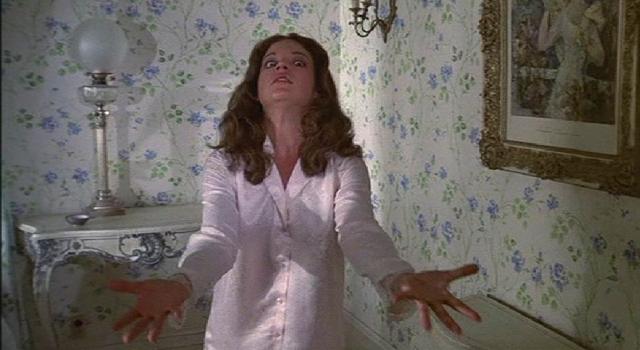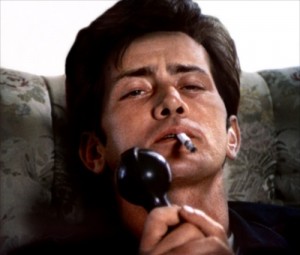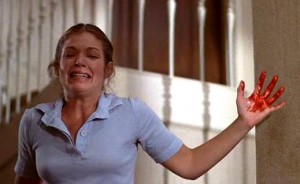This is the third part of Michał Oleszczyk’s consideration of Pauline Kael, just days before he defends his PhD dissertation on Kael. Read his review of the Kael biography A Life in the Dark, and his five favorite Kael reviews.

When Pauline Kael goes wrong, she goes wrong all the way. More often than not, you may find yourself talking back to her – even as you can’t stop reading the piece that made you fume through the ears in the first place. It’s a measure of the rage Kael was capable of inspiring that New York Review of Books reviewer Renata Adler declared Kael’s When the Lights Go Down not simply a so-so book, but rather one “jarringly, piece by piece, line by line, and without interruption, worthless.” And not for nothing did George Lucas name his Willow villain “General Kael” (which the critic expertly acknowledged in her review as a “hommage à moi”).
Here five Kael pieces that, when read aloud at any cinephile gathering, will have more than one listener reach for their coats and hiss:
5. “The Come-Dressed-as-the-Sick-Soul-of-Europe Parties”
Alain Resnais’ seminal Last Year at Marienbad has inspired generations of art-house film buffs to decode its multiple meanings and pore over the numerous riddles in practically every shot. Kael, to put it mildly, didn’t play ball:
Mustn’t the movie be seen – if it is to be enjoyed – as an exercise in décor and romantic mystification? I was intrigued by the palaces and parks and wanted to know where they were, who had built them, and for what purposes (I was interested in all the specific material that Resnais was attempting to make unspecific). (…) But when this exercise goes on for an hour and a half, the figures abstracted from all living detail become as tiresome as shadow dancers. Lousy story, but great sets.
(Collected in I Lost It at the Movies, p. 189)
4. “Sugarland and Badlands” (review of Terrence Malick’s Badlands)
To many, Terrence Malick’s directorial debut, Badlands, seemed revelatory in its otherworldly detachment from the Bonnie and Clyde-type anti-heroes it featured. Among the fans was Kael’s New Yorker editor, William Shawn, who dared to express his concern at the pan his star-critic was about to publish. “I guess you didn’t know that Terry is like a son to me,” he was to say, to which Kael replied with her famous “Tough shit, Bill”.
Our only possible involvement is in admiring Malick’s tasteful effects while he demonstrates Kit’s and Holly’s nothingness. (…) The movie can be summed up: mass-culture banality is killing our souls and making everybody affectless. Invasion of the Body Snatchers said the same thing without all this draggy art; it managed to be moderately entertaining and very scary. (…) Badlands has no more depth than The Sugarland Express, and I found its cold detachment offensive.
(The New Yorker, March 18, 1974 – collected in Reeling, pp. 411-412)
3. “Shivers” (review of Brian De Palma’s The Fury)
You’d think Kael experienced the rapture at a screening of The Fury. The following litany of directors who would supposedly defer to De Palma becomes a real head-scratcher, especially if you see the movie and find it kind of… OK.
This finale – a parody of Antonioni’s apocalyptic vision at the close of Zabriskie Point – is the greatest finish for any villain ever. One can imagine Welles, Peckinpah, Scorsese, and Spielberg still stunned, bowing to the ground, choking with laughter.
(The New Yorker – March 20, 1978 – collected in When the Lights Go Down, p. 421)
Critic David Thomson, who actually sat next to Kael as she was watching the film, had this to say:
“And the noises she was making — the tiny hedgehog squeaks and raptures — were part of a nearly writhing rapport with the film up there on the screen. She was in love with it. She was, nearly, making love to it”.
2. Review of Billy Wilder’s One, Two Three
You happen to love Wilder’s machine-gun-paced Cold War farce? You may be picking up a machine gun after reading Kael’s fierce pan of the picture:
In Hollywood it is now common to hear Billy Wilder called the world’s greatest movie director. This judgment tells us a lot about Hollywood: Wilder hits his effects hard and sure; he’s a clever, lively director whose work lacks feeling or passion or grace or beauty or elegance. His eye is on the dollar, or rather on success, on the entertainment values that bring in dollars. But he has never before, except perhaps in a different way in Ace in the Hole, exhibited such a brazen contempt for people. (…) Is One, Two, Three really the irreverent political satire the critics have called it, or is it just a lot of scattershot and noise and simulated action – Hellzapoppin’ in Berlin?
(Collected in I Lost It at the Movies, p. 153)
1. Notes on 2001: A Space Odyssey
A revelation to many, and a regular fixture on all-time top ten lists, Stanley Kubrick’s epic sci-fi prophecy was a mere trifle to Kael’s merciless eye. Incidentally, some lines in her attack resonate with the words of many naysayers of The Tree of Life; is history repeating?
Kubrick literally learned to stop worrying and love the bomb; he’s become his own butt – the Herman Kahn of extraterrestrial games theory. The ponderous blurry appeal of the picture may be that it takes its stoned audience out of this world to a consoling vision of a graceful world of space, controlled by superior godlike minds, where the hero is reborn as an angelic baby. It has the dreamy somewhere-over-the-rainbow appeal of a new vision of heaven. 2001 is a celebration of a cop-out. It says man is just a tiny nothing on the stairway to paradise, something better is coming, and it’s all out of your hands anyway. There’s intelligence out there in space controlling your destiny from ape to angel, so just follow the slab. Drop up.
(“Trash, Art and the Movies” – collected in Going Steady, p. 150)
Michał Oleszczyk is a contributor to “Kino”, the Polish film monthly and author of the first Polish monograph of Terence Davies (“Bitter Exile”, Kraków 2008).









